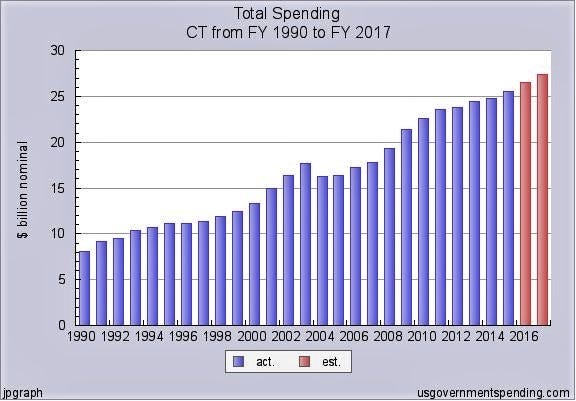
Please Follow us on Gab, Minds, Telegram, Rumble, Gab TV, Gettr, Truth Social, Twitter
Ordinary people – that is to say, non-politicians who have no reason to fudge the truth – know that there are only three ways they may liquidate their debts.
They might 1) increase their earnings by, say, getting another job or, less likely, winning a pot at one of Connecticut’s Indian casinos, and use their increased earnings to pay down their debt. They might 2) reduce their debt through a declaration of bankruptcy or, in other words, stiff their creditors. Or they might 3) carry their debt to their graves. The dead usually are not pursued by creditors beyond the grave, and there are in the United States no debtors’ prisons.
Governments, however, are not ordinary people. A state government may discharge its debt by raising taxes or cutting spending. Of these two means, cutting spending is the less popular among politicians. That is why, facing a troubling, steadily increasing debt of some $95 billion, one rarely hears falling from the lips of Connecticut politicians well-wrought plans to cut spending – permanently and long term.
Among neo-progressive politicians, tax increases are regarded as permanent, and spending cuts are thought to be temporary inconveniences. There are just too many people in the state invested in a gradual escalation of spending. State government may relieve its debt through the selling of bonds, but only when the haul from bonds is, in fact, applied to a reduction of debt – not always.
As proof that tender skinned politicians usually prefer tax increases rather than spending reductions to pay down state debt, the readers of these lines are invited to peruse the last 20 years of their favorite paper’s news reports and tally how often the expression “spending cut” has been recommended by politicians, reporters and editorialists as a means of reducing state debt.
The federal government, of course may print money to pay its debts, but the printing of money leads ineluctably to inflation, defined by economists who have no political axe to grind as “too many dollars chasing too few goods.”
Inflation is an insidious hidden tax on the price of goods and services. The inflation tax reduces the purchasing power of the dollar and adversely impacts overtaxed citizens who, unlike the federal government, cannot produce monopoly money with which they may pay down their debts. Nor are responsible citizens inclined to fob off their debts on their children or grandchildren, a favorite pastime of tax hungry, spending-prone governments. It has become common practice among government officials to spend recklessly and pass along to taxpayers as yet unborn the ravages of their profligate spending.
Connecticut, we are told by Governor Ned Lamont, has installed “guardrails’ to prevent our huffing and puffing spending locomotive from jumping the tracks. For anyone who has been spared the “new math” in elementary school, it is obvious that Connecticut has regularly jumped the tracks. If spending in the state had been adjusted over the years to increases in the state’s Gross Domestic Product (GDP), Connecticut would not now be laboring under a debt of $95 billion. The same rule of thumb applies to federal spending.
“Connecticut,” National Public Radio told us last November 2022, “still faces a huge pile of debt, but over the past year alone, it has wiped out more than $7 billion out of a $95 billion problem — a 7.4% drop — and more debt is expected to come off the books soon.”
Lamont, and non-MAGA Connecticut Republicans, without whom the spending guardrail would not have been installed, did manage to cut spending a smidgen – always good news -- but the Governor and the state are sitting on a spendable surplus, and there’s the rub.
“An economy on the brink of recession and 9% inflation wasn’t enough to stop state government’s surplus from shattering the $4 billion mark,” according to a July 22, 2022 report in National Public Radio.
Both neo-progressives in Connecticut’s General Assembly and some Republican agree that surpluses should be liquidated. Republican State Senator Kevin Kelly has boldly argued that a surplus is by definition an overcharge that should be returned to taxpayers, who need their own assets to provide for their own unstable futures. Neo-progressives want to spend the surplus on various projects dear to neo-progressives. And, surprisingly, Dan Haar, writing in the New Haven Register, argues that Connecticut’s tax cuts are “spread out in too many places with too much focus on low-income people when what Connecticut needs is a high-profile cut for the middle class, in bright lights.
“Here's why: If we're talking about jolting the economy, it's not just about the flow of dollars. It's the signal, the optics that matter almost as much -- especially when it comes to attracting people to come to the state. That's what Connecticut needs most of all.”
All parties should agree that spent surpluses are added as future budget costs which, come to think of it, is how state government, over the course of a few decades, has arrived at an insupportable state debt of $95 billion.
Don Pesci is a political columnist of long standing, about 40 years, who has written for various state newspapers, among them The Journal Inquirer, the Waterbury Republican American, the New London Day, the Litchfield County Times, the Torrington Register Citizen and other Register Citizen papers. He maintains a blog, among the oldest of its kind in Connecticut, which serves as a repository and archive, for his columns; there are approximately 3,000 entrees in Connecticut Commentary: Red Notes From A Blue State, virtually all of them political columns stretching back to 2004. He also appears once a week Wednesdays on 1080 WTIC Newstalk radio with Will Marotti.

